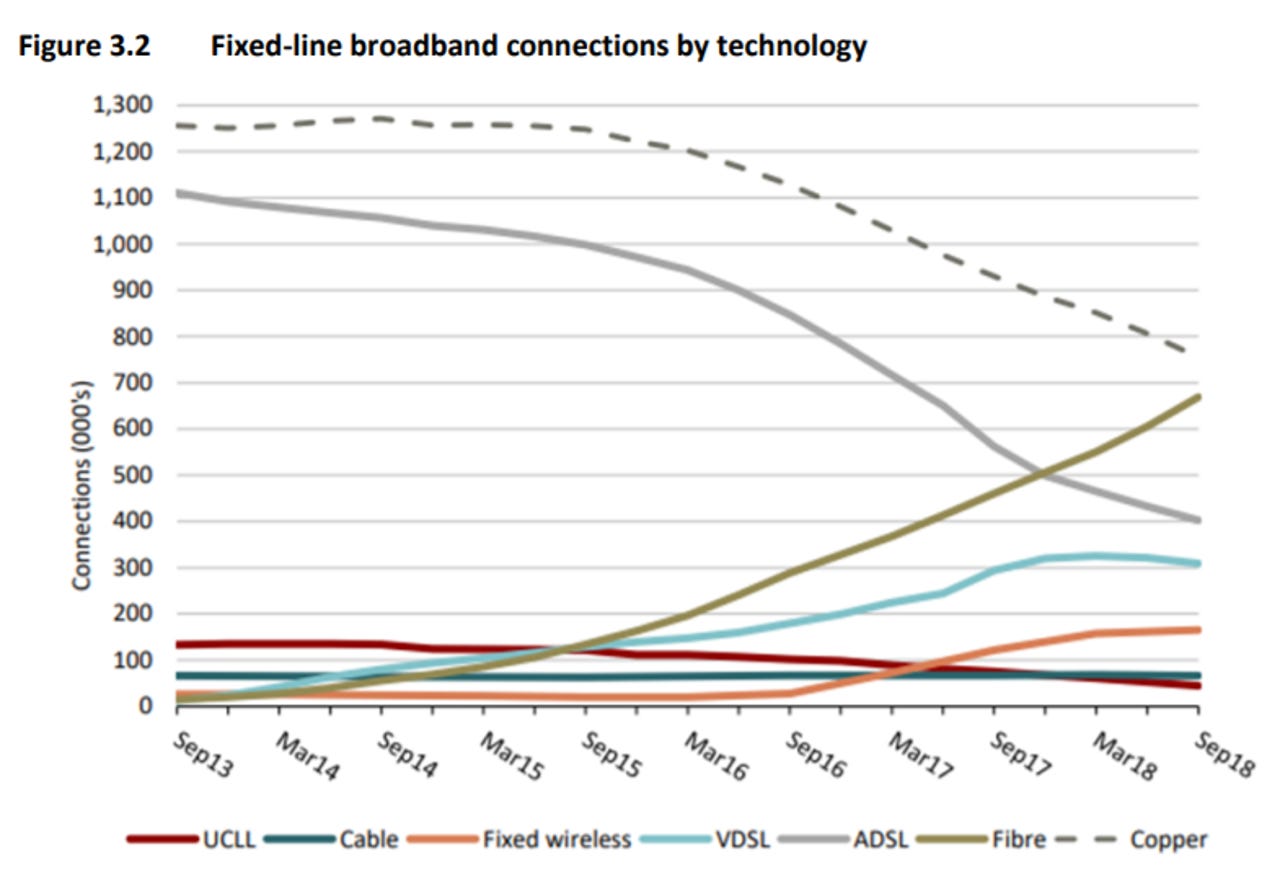Spark copper voice services to be deregulated across New Zealand


The rise of fibre
With fibre and other new services now available across New Zealand, the nation's regulator has made the draft decision to deregulate the resale copper voice services of carrier Spark.
"Consumers are making the switch away from legacy copper-based voice services. Other providers offer wholesale voice services that compete with these services, meaning regulation is no longer necessary," Telecommunications Commissioner Dr Stephen Gale said on Wednesday.
"We consider that competition has been established, is increasingly effective, and is no longer dependent on access to these services."
The three fixed network services being offered via a fixed telco network, that are subject to the recommendation, include local access and calling services; retail services; and retail services offered as part of a bundle.
"Our draft view is that we will recommend to the Minister of Broadcasting, Communications and Digital Media that the three resale services are omitted from Schedule 1 forthwith," the draft report [PDF] said.
Spark welcomed the decision, noting that it would be upgrading its services with next-generation voice technologies.
"The removal of regulation is a positive signal that our regulatory regime can adapt to reflect changing competitive dynamics," the carrier said in a statement to the Australian Securities Exchange (ASX).
"Spark is already well under way in its transition from its legacy PSTN voice network to a future-ready IP-based voice network dubbed the 'Converged Communications Network' (CCN)."
Spark had previously said it aimed to have 85% of its broadband customer base come from copper connections by 2020 under its "Upgrade New Zealand" program, through which Spark would shift users onto higher-speed and more reliable wireless and fibre broadband.
The Commerce Commission is accepting submissions to its draft report by May 17, and will provide the final report in July 2019.
Back in 2016, the commission found that broadband services were capable of providing voice services -- and for the "very small number" of premises not situated within a fast fibre broadband footprint, or covered by fixed-wireless services thanks to the New Zealand government's Rural Broadband Initiative or mobile services, Spark's services were already capped by its Telecommunications Service Obligation.
It also found that there is currently sufficient competition in the market from Chorus, local fibre companies, and fixed-wireless operators.
"Competition has been established, is increasingly effective, and is no longer dependent on access to the resale services. Chorus, the local fibre companies, and fixed-wireless operators all have the infrastructure to offer alternative wholesale voice services to RSPs," it said at the time.
"Competition from these wholesale alternatives will incentivise Spark to continue supplying the resale services. This competition will also constrain Spark from exercising significant market power in respect of the resale services."
However, at the time it said there should be a wait time of two years before the issue is re-examined and a final decision is made.
"We propose amending our 2016 final report recommendation from [to] 'not omit Resale Services from Schedule 1 of the Act at this time' to say, 'omit Resale Services from Schedule 1 of the Act with immediate effect'," the commission's report said this week.
Related Coverage
Spark extends Cat-M1 IoT network across New Zealand
Just five months after launching the network, Spark has announced that its Cat-M1 IoT coverage now reaches 98 percent of the New Zealand population.
Spark NZ tests 5G autonomous car
A self-driving car connected to Spark's trial 5G network is being tested in Auckland's Innovation Precinct.
New Zealand bans Spark from using Huawei for 5G
The New Zealand GCSB said the use of Huawei equipment in Spark's 5G network would 'raise significant national security risks'.
Policy pack: Guidelines for remote workers
The modern workforce—and the companies that employ them—have increasingly embraced the concept of telecommuting. The benefits are well documented, including stress reduction, increased productivity, a...